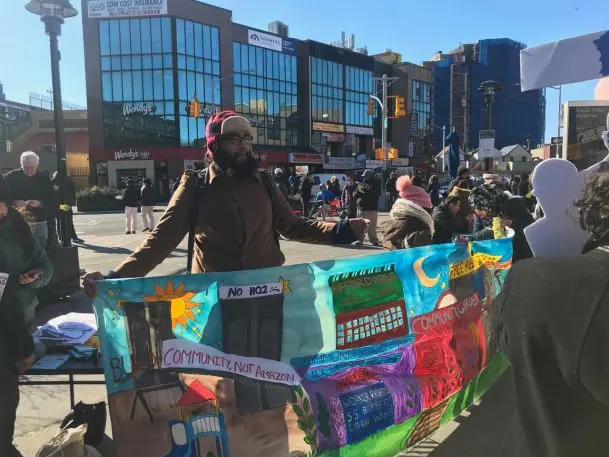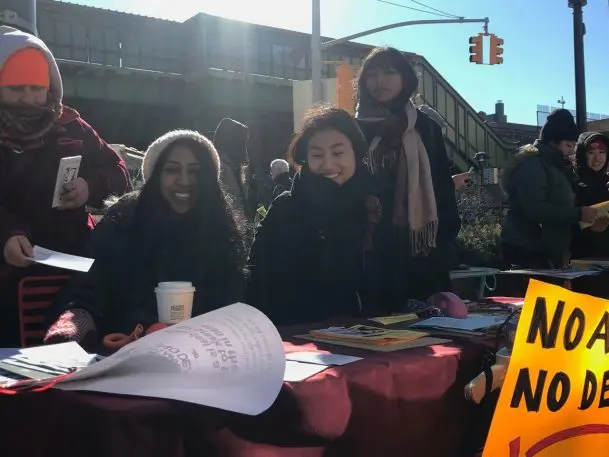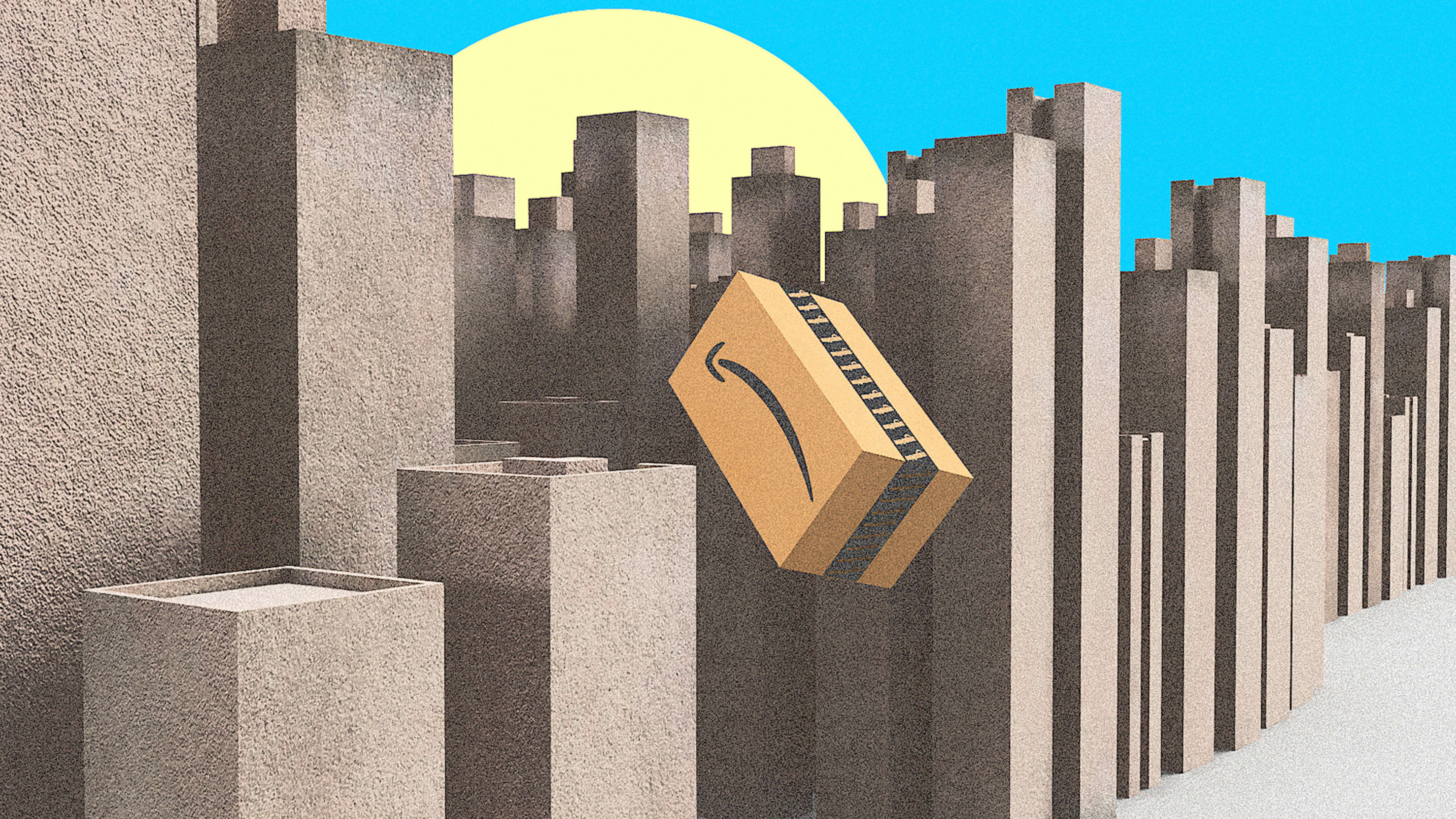Yesterday, Amazon abruptly announced that it would abandon its plan to build a second headquarters in Long Island City, Queens. For some politicians, like Governor Andrew Cuomo and Mayor Bill Di Blasio, who were key supporters of the deal, it was a devastating loss for the city. But for many Queens residents, fearful that Amazon’s arrival would mean rising housing costs and displacement, it’s a victory.
The decision underscores the power of activism in cities, and the power of local communities to oppose policies and development projects that they feel won’t benefit them. It’s also part of a resurgence of grassroots activism around affordable housing, education, and public space in cities.
“The promise of new jobs and more money isn’t appealing to working class folks who know they’ve been shut out of this process entirely, not just now but for decades before,” says Lena P. Afridi, the director of economic development policy at the Association for Neighborhood and Housing Development, a nonprofit that supported several other local organizations in the fight against Amazon. “It’s always been thought that development is good, and influx of capital is good. But people are starting to realize the impact it’s going to have on housing, infrastructure, schools, and entire neighborhoods.”

Afridi says she sees the same kind of backlash playing out when it comes to smaller projects as well. It’s a common response to developers that come into a community without listening to or accommodating locals’ concerns, both in American cities and abroad. There have been other high-profile victories in recent years: In Berlin, activists fought against Google’s attempt to turn an old electric company building into a tech incubator, successfully convincing the tech giant to abandon the development in fall 2018. At the same time, some developers have managed to find middle ground with activists who have fought for their voices to be heard. For example, the developers behind the Kingsbridge project in the Bronx, which aims to transform an old armory into an ice skating complex, reached an agreement with community groups in 2014 that included providing free skate time for local kids and 50,000 square feet of community space.
While some developers have found ways to compromise and work with community groups, Amazon’s decision to cancel the project just a few months after choosing NYC seems tied to its refusal to engage the communities it would have impacted. In other words, it was Amazon’s way, or no way at all.
“Today’s behavior by Amazon shows why they would have been a bad partner for New York in any event,” said New York State Senator and fierce Amazon opponent Michael Gianaris in a statement. “Rather than seriously engage with the community they proposed to profoundly change, Amazon continued its effort to shakedown governments to get its way. It is time for a national dialogue about the perils of these types of corporate subsidies.”
One reason that New Yorkers were opposed to the Amazon headquarters was the fact that the company was set to receive about $3 billion in tax breaks from the city and the state. According to Afridi, the policies that enable these kind of subsidies date back to the 1970s, when few companies were interested in moving to New York City.
“It was for an economic and political movement that no longer exists,” she says. “New York City has been doing great for the past two decades. But we’ve seen rampant inequality, a ton of displacement, and unfettered development without the protections that people need to stay in their neighborhoods and communities.”
But over the past two decades, the kind of urban activism that led to victory against Amazon or the Kingsbridge agreement has been less common in New York. Even in the ’50s and ’60s, activism around urban planning issues like gentrification and displacement was strong, thanks to the efforts of urbanists like Jane Jacobs. It died out in the ’70s and ’80s. Since then, most major developments have faced opposition from activists, but they’re rarely effective–likely because corporate interests are so powerful and activists don’t usually have the sheer numbers and political backing that the anti-Amazon movement was able to use. In particular, Queens and Bronx Congressmember Alexandria Ocasio-Cortez opposed the deal and rallied many online against it.
“Anything is possible: today was the day a group of dedicated, everyday New Yorkers & their neighbors defeated Amazon’s corporate greed, its worker exploitation, and the power of the richest man in the world,” she wrote on Twitter after the news broke.
In its announcement, Amazon states that it was the opposition of local politicians that convinced it not to move forward with HQ2 in Queens, with no mention of local activists. Instead, the company maintains it had strong support from the people, pointing to a poll–backed by Amazon–showing that 70% of New Yorkers supported the plan.

“New York has this amazing history of organizing, of communities coming together, and sticking up for themselves and achieving these amazing wins,” says Will Spisak, the director of programs at Chhaya Community Development Corporation, which advocates for affordable housing in predominantly South Asian and Indo-Caribbean communities in Queens. “But I do feel that for several decades, this kind of big real estate speculation has really been calling the shots. They’ve been pushing communities around.”
Spisak, who was on the front lines of the fight against Amazon, is referring to a trend of developers coming into what he calls “traditionally disinvested communities,” where corporations try to take advantage of cheap real estate–similar to what has happened in the neighborhoods of Williamsburg and Bushwick in Brooklyn. The Amazon project, with its incredible scale, would have taken over a large, underdeveloped area in Long Island City, which is already an expensive neighborhood, but the ripple effects would have impacted neighborhoods around the entire borough.
Chhaya organized in neighborhoods like Jackson Heights and Flushing as well as Long Island City, reaching out to local tenants, homeowners, and business owners to educate them about the Amazon project and hear their perspectives. Spisak says the organizers were doing outreach in Mandarin, Urdu, Hindi, Nepali, and Spanish, reaching across all kinds of neighborhoods and ethnic communities. “Most of the time it didn’t take much because people knew right away when they heard about this coming that it wasn’t going to benefit them–that it would continue to displace people along the lines of what we’ve been seeing in our neighborhoods for a decade if not longer,” Spisak says.
Ultimately, the win might be a signal that urban activism is back in a big way. “I also think that, in our hope, it’s the beginning of something, too,” Spisak says. “Because of the scale of this issue, we were able to engage people that might not have necessarily been plugged into smaller developments . . . Ultimately this will remind people that organizing gets results. That when you fight, you can win.”
Spisak hopes that this also reminds developers that community engagement isn’t an obstacle–it’s a necessity. Or, as Amazon found out, there will be consequences.
“When communities come together, even a Goliath like Amazon realized you can’t win,” Spisak says. “You can’t push around 8 million Davids.”
Recognize your brand’s excellence by applying to this year’s Brands That Matter Awards before the early-rate deadline, May 3.
